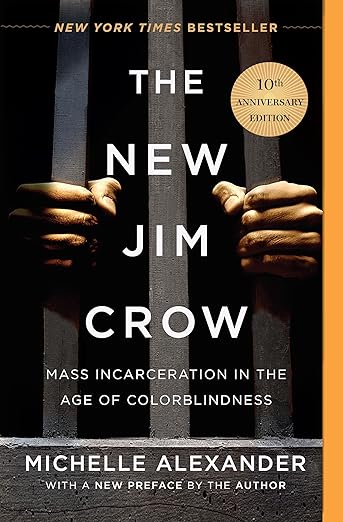Racial Bias in Drug Enforcement

In her book The New Jim Crow (Alexander, 2010 ), Michelle Alexander makes the claim that while overt discrimination based on race is no longer socially acceptable, discrimination against those convicted of a crime is. She notes that while crime rates in America are roughly equal with those of other Western nations, incarceration rates have consistently soared, despite those domestic crime rates being below the international average. This exponential growth has been fueled by drug policy, whose enforcement has fallen disproportionately upon people of color. As a result, more people of color are incarcerated in the US than there were in South Africa at the height of apartheid.
While some, such as criminologist Barry Latzer, have taken issue with Ms. Alexander’s view, it is difficult to argue seriously that the War on Drugs™ impacts all population subgroups equally. Consider that, in 1985, prior to the passage of the Anti-Drug Abuse Act of 1986, of roughly 22000 inmates arrested primarily for drug offenses, 39% were black and 38% were white (Mitchell, 2009). By 2003, the number of arrests was five times larger, and the proportions of detainees were 53% black and 30% white. To frame the issue in even more depth, by 1999, roughly 2% of the black population was incarcerated, with 1 in 10 black males between the ages of 20 and 30 in state or federal prison (Bobo & Thompson, 2006). As Simon (2007) observes, with such a large proportion of incarcerated young, black males, prison plays a more important socializing roles in affected communities than college, marriage, the military, and has a similar socializing impact as the labor market.
It must be asked; what justifies these disparities? A differential involvement paradigm would reveal that minorities are arrested, convicted, and incarcerated more often simply because they engage in more criminal activity. This is, in fact, the view of many policymakers, law enforcement officials, and much of the public. Yet, it has been repeatedly shown that blacks and whites use and sell drugs at similar rates (Rosenberg, Grooves, & Blankenship, 2017). Moreover, it has been shown that when looking at crimes unrelated to drug activity, such as rape, robbery and assault, blacks and whites of similar socioeconomic commit such crimes at roughly the same rate (Harrell, Langton, Berzofsky, Couzens, & Smiley-McDonald, 2014). Therefore, differential involvement cannot explain why blacks are up to 57 times more likely to be imprisoned for drug-related crimes than their white counterparts.
The answer lies within the purview of differential selection, in which enforcement efforts trend towards specific characteristics which are more readily visible. As Mitchell and Caudy (2015) observe, blacks, as well as Hispanics (who also have higher incarceration rates than whites), tend to aggregate in lower-class, inner city neighborhoods where drug activity is much more public and transparent, such as street corners and “crack houses.” As opposed to larger, more clandestine transactions between associates in more affluent neighborhoods, transactions in these areas tend to be smaller, more frequent, and between strangers with little, if any, personal loyalty between them. Finally, with the surplus of smaller dealers and sub-traffickers, these entrepreneurs naturally form into gangs to protect their interests in the profitability of distribution territories, which leads to street violence.
This makes targeting these areas a rational exercise for law enforcement. Operating under the mandate to deter both the supply and usage of drugs, street sweeps, raids of drug houses, and other such measures allow policymakers and law enforcement officials to claim a growing number of victories, despite no measurable decrease in either supply or demand. Adding to the absurdity of this differential selection is that the majority of blacks incarcerated have not been convicted of trafficking or distribution, but of possession, despite the acknowledgment of the United States Sentencing Commission that the vast majority of users are white (Nunn, 2002). This all creates a self-perpetuating cycle of racially motivated enforcement bias, justifying extant perceptions by creating and furthering the paradigm in which they are justified.
Under current federal and most state laws, the majority of drug offenses – even possession of small amounts of illegal substances, are classified as felonies. This creates massive negative repercussions for individuals convicted of these offenses. Those with felony records have been shown to earn significantly less in the labor market than others over their respective lifetimes, even those who were skilled laborers before conviction. This is not due solely to the wages loss during the time incarcerated, but also because of the stigma private employers often place on felony records, as well as the loss of social networks that inform their members of legitimate opportunities. Convicted individuals are generally ineligible for student loans to further their education, admission into military service, and other similar avenues known to enhance socioeconomic mobility. Perhaps most insidiously, those convicted of felony drug crimes are disenfranchised, often unable to press their case to policymakers who have little incentive to address the concerns of those who can no longer vote. It is important to not that the above repercussions are consequences that accrue to the individual convict. Families and communities are also impacted, too often leading to intergenerational cycles of decreased socioeconomic mobility and increased criminality (Gust, 2012), (Foster & Hagan, 2009); a subject which will not be expanded upon here because it requires its own treatment.
Tarnell Brown is an Atlanta based economist and public policy analyst.

